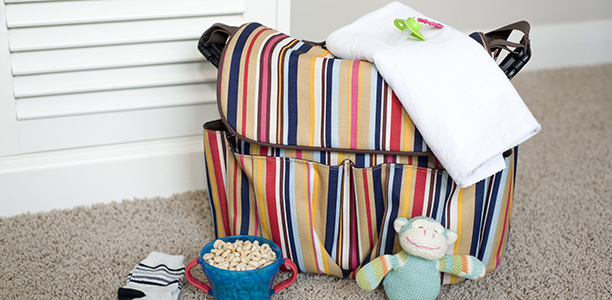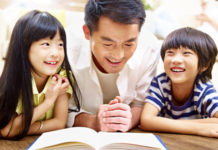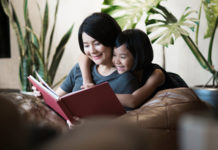- Your go-to nappy bag checklist!
- Newborn: 0-3 months
- Babies: 3-12 months
- Toddlers: 1-3 Years
- Adults
- Quick trip
- Downloads
Your go-to nappy bag checklist!
It’s great for parent and child to get out of the house. Whether it’s for a necessary run to the shops, a social outing, or even just a breath of fresh air, getting out can revitalise overtired parents and entertain children. But there are a few things you need to take with you, no matter where you go, or you might start to think outings are more trouble than they’re worth! Nothing says unprepared like waiting at the checkout with a new bag of nappies and a smelly child. Don’t worry if that happens, though. You won’t be the first, and at least you’re in a place where you can get the needed supplies. Don’t be afraid to ask another caregiver for help if you need to. Lots of parents will be happy to donate a spare nappy or some wet wipes – many will have been in the same situation at some point.
Packing a nappy bag or change bag can seem complicated, especially for first time mums and dads. The items in your child’s bag will change based on their age. You can relieve stress by packing the bag ahead of time. We have put together packing checklists based on the age of your child.
You can purchase a specially marketed nappy bag, a new generic bag, or just use a bag you already own. Try to find bags that have a waterproof lining. They are easier to clean and often last longer. Using a backpack as a change bag can be handy if you intend to do lots of walking. Using a bag that fits on or under your pram can also help keep your arms and back from getting tired – just be aware of the pram’s guidelines on how to attach your nappy bag, and of leaving valuables unattended in public areas (as with trolleys in supermarkets). Also, think about bags with multiple sections, or use plastic bags to keep items separated. This will help you keep organised, and protect clothing from any liquid spills. Make sure the bag has a secure compartment for your keys, wallet, phone and other personal items.
Consider having two nappy bags prepacked with the essentials. One bag can be for quick trips and the other can be prepared for longer day outings. A trip to the supermarket may only need one spare nappy just in case, but you’re sure to need more if you’re out for the day. It’s also not a bad idea to keep a few emergency supplies in your car boot – just remember to update them from time to time.
Newborn: 0-3 months
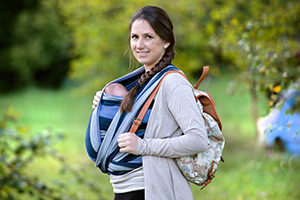 Newborns need a lot of care. They need to feed and be changed frequently, and are prone to making a mess of their clothes. Expect any trip to need at least one feed and change, and then you’ll be prepared. The longer you’re out, the more supplies you’ll need in your nappy bag.
Newborns need a lot of care. They need to feed and be changed frequently, and are prone to making a mess of their clothes. Expect any trip to need at least one feed and change, and then you’ll be prepared. The longer you’re out, the more supplies you’ll need in your nappy bag.
Changing
- Nappies – at least two
- Disposable wipes – Save space by placing a small handful of wipes in a plastic bag, zip lock bag or reusable wipe container
- Change mat – You can choose to use a towel from home, purchase your own, or use disposable change mats. Some change bags will come with their own reusable mat
- Nappy rash cream, if needed.
Feeding
- Insulated bottle holder – if bottle feeding
- Baby bottle – if bottle feeding. Pack an extra in case you are out longer than expected
- Formula – if formula feeding. Pre-measured portions in plastic containers can save stress
- Boiled water – if formula feeding
- Burping cloth – at least two
Clothing
- Baby clothing – spare changes, exact items depending on the season
- Singlet
- Baby onesie
- Jumper
- Baby wrap – an extra can be used as a nursing cover if desired during breastfeeding
General items
- Plastic bags – at least two: one for dirty nappies and one for dirty clothing
- Hand sanitiser
- Tissues
- Medicines – if needed (check the instructions, you may need to store them in a cool pack)
- Hat
 |
Download the Newborn Nappy Bag Checklist in a printable pdf format. |
Babies: 3-12 months
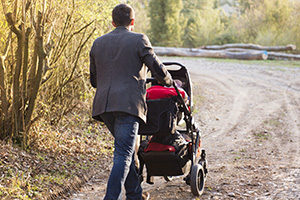 As they get older, babies will need fewer feeds and changes – but they will also start eating solids. Don’t forget to pack a snack in your nappy bag, even if you don’t expect to be stopping for a meal.
As they get older, babies will need fewer feeds and changes – but they will also start eating solids. Don’t forget to pack a snack in your nappy bag, even if you don’t expect to be stopping for a meal.
Changing
- Nappies – at least two
- Disposable wipes – Save space by placing a small handful of wipes in a plastic bag, zip lock bag or reusable wipe container
- Change mat – You can choose to use a towel from home, purchase your own, or use disposable change mats. Some change bags will come with their own reusable mat
- Nappy rash cream, if needed
Feeding
- Insulated bottle holder – if bottle feeding
- Baby bottle – if bottle feeding. Pack an extra in case you are out longer than expected
- Formula – if formula feeding. Pre-measured portions in plastic containers can save stress
- Boiled water – if formula feeding
- Snacks – Differs depending on the age of your child. Small packets of baby food are a good idea – you can put these in a refillable pouch or container that won’t leak for purees or solids, or you can purchase ready-made snacks
- Baby spoon
- Water – sippy cup or water bottle
- Bib – at least two
Clothing
- Spare changes, exact items depending on the season
- T-shirt
- Bottoms
- Socks
- Small blanket – multiple uses: nursing cover, burping cloth, bib
General items
- Plastic bags – at least two: one for dirty nappies and one for dirty clothing
- Hand sanitiser
- Tissues
- Medicines – if needed
- Baby sunscreen (from 6 months +)
- Insect repellent (from 6 months +)
- Hat
- Favourite comforter toy
- Teething ring
- Other toys
 |
Download the Baby Nappy Bag Checklist in a printable pdf format. |
Toddlers: 1-3 Years
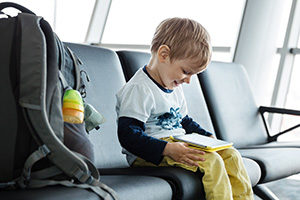 Toddlers can be very active, and prone to getting dirty or losing things like socks. If your toddler is toilet trained or training, there may still be accidents when you’re out so you’ll need to prepare for that.
Toddlers can be very active, and prone to getting dirty or losing things like socks. If your toddler is toilet trained or training, there may still be accidents when you’re out so you’ll need to prepare for that.
Be aware that some places prefer that you don’t bring your own non-baby food (such as cafes), and others may have rules against bringing certain types of food like nuts (such as some indoor playgrounds).
Changing
- Nappies – depending on stage of toilet training
- Underwear – two extra pairs
- Disposable wipes
- Change mat
Feeding
- Baby bottle, formula and boiled water – if needed
- Extra water bottle
- Healthy snacks
Clothing
- Complete change of clothes, especially bottoms
- Spare socks
General
- Plastic bags – at least two: one for dirty nappies and one for dirty clothing
- Hand sanitiser
- Tissues
- Medicines – if needed
- Child sunscreen
- Insect repellent
- Hat
- Favourite comforter toy
- Other toys
- Portable potty, or plastic toilet seat – if needed, most easily stored in the car
 |
Download the Toddler Nappy Bag Checklist in a printable pdf format. |
Adults
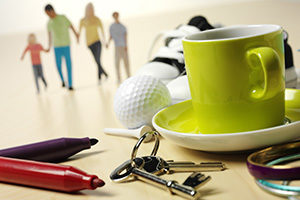 You need to look after yourself as well as your child. Babies can make a mess of the clothes of anyone touching them, so pack a change of clothes for yourself in the nappy bag. Frazzled parents can also forget the most basic items, so it doesn’t hurt to prepare in advance. Before stepping out of your home, take a moment to pause and check yourself. You don’t need the added stress of forgetting your wallet or shoes on a trip to the shops.
You need to look after yourself as well as your child. Babies can make a mess of the clothes of anyone touching them, so pack a change of clothes for yourself in the nappy bag. Frazzled parents can also forget the most basic items, so it doesn’t hurt to prepare in advance. Before stepping out of your home, take a moment to pause and check yourself. You don’t need the added stress of forgetting your wallet or shoes on a trip to the shops.
Essentials
- Wallet
- Phone
- Keys
Mother care
- Breast pump – if used
- Breast pads – especially in the first few weeks, until you know how much you need them
- Sanitary or maternity pads – if needed
- Medication – if needed
- Water bottle
- Quick snack
Clothing
- Spare change of clothes – this may include an extra maternity bra depending on the amount of leakage.
- Hat
 |
Download the Adult Nappy Bag Checklist in a printable pdf format. |
Quick trip
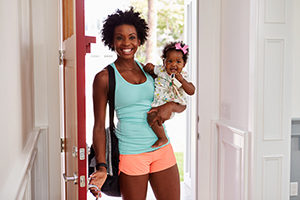 No matter the age of your child, there are some things you’ll want just for a quick outing of no more than half an hour. Here are the essentials for a light change bag.
No matter the age of your child, there are some things you’ll want just for a quick outing of no more than half an hour. Here are the essentials for a light change bag.
Changing
- Spare nappy or underwear
- Disposable wipes
- Change mat – if needed
Feeding
- Baby bottle, formula and boiled water – if needed
- Small cloth/blanket – if needed for burping or wiping clothes/faces
- Water bottle
General items
- Plastic bags – one for dirty nappies and one for dirty clothing. You can store the changing supplies in these until they are needed
- Tissues
- Toy
 |
Download the Quick Nappy Bag Checklist in a printable pdf format. |
Downloads
- Newborn nappy bag checklist
- Baby nappy bag checklist
- Toddler nappy bag checklist
- Adult nappy bag checklist
- Quick nappy bag checklist
References
- Foodsafety.gov. Baby food and infant formula. 2017. (cited 7 February 2017). Available from: (URL link)
- Department of Health, Western Australia. Becoming a parent: Emotional health and wellbeing. 2009. (cited 7 February 2017). Available from: (URL link)
- NHS UK. Getting out and about with twins. 2016. (cited 7 February 2017). Available from: (URL link)
- Raising Children Network. New baby checklist: Home and baby equipment. 2016. (cited 7 February 2017). Available from: (URL link)




